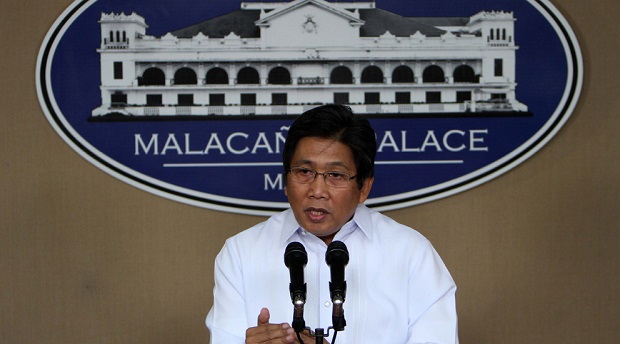Palace wants next President to follow ‘right is might’ policy
Malacañang on Thursday said it wanted the next administration to adopt President Aquino’s policy of “right is might” in handling the territorial dispute with China in the West Philippine Sea.
The Palace also expressed the belief that next year’s presidential election would not make the Philippines more vulnerable to China’s expansionism.
“We believe that it is the right action because of the concrete reality we are facing,” Communications Secretary Herminio Coloma Jr. told reporters, referring to President Aquino’s decision to solve the territorial dispute with China according to international law.
Int’l support
Coloma reiterated that when Aquino said in his final address to Congress on July 27 that the national elections in 2016 would be a referendum on his administration, it certainly included the aspect of foreign policy.
Article continues after this advertisement“I think we should not think we would be in a vulnerable situation because our position is recognized by the international community and the next administration should also consider the repercussions (of the current foreign policy) on our country and our economy,” Coloma said.
Article continues after this advertisementHe added that it was unlikely the next administration would shelve President Aquino’s foreign policy without taking into consideration the long-term consequences.
Coloma said the “big picture” in the West Philippine Sea dispute showed that the Philippines had been joined by the Association of Southeast Asian Nations (Asean) and the Group of Seven (G-7) industrialized nations and the European community in the search for a peaceful resolution of the controversy.
“These countries now have the same position—that international law must be followed… Let us not just look at the Philippine position. I think one of the important things to consider is the position laid out by President Aquino that ‘right is might,’” Coloma said.
Vulnerable position
Security and maritime experts, however, believe that the election season would put the Philippines in its most vulnerable position with the increasingly ticklish regional security landscape.
“In 2016, the international community may withhold its open support for our country’s cause depending on the continuation or discontinuation of our foreign policy. For example, if you have a President [who] is more sympathetic [to] China, or a President [who] is more sympathetic to the US, other players in the dispute will have to study these persuasions more clearly before throwing its support to our cause,” lawyer Martin Loon said.
Loon, the first Filipino lawyer to have a master’s degree in national security laws from Georgetown University, told the Inquirer that such factors “will affect the extent and depth of support [the Philippines will] get from the international coalition [it] intends to build to respond to this issue.”
Weakest period
For University of the Philippines (UP) law professor Jay Batongbacal, elections are “always the weakest period for any country” because of the likelihood of changing foreign policies.
“Whether the next administration will continue the arbitration will depend on when it is actually decided,” said Batongbacal, the director of the UP Institute for Maritime Affairs and Law of the Sea.
Batongbacal said that in the likelihood that the United Nations arbitral tribunal dismissed the Philippines’ case against China, “the next administration would have a free hand” to adopt the same strategy employed by President Aquino in dealing with the China issue or “take an entirely different route.”
But Sen. Antonio Trillanes IV, a former Navy officer, said he was not “ready to say that [the Philippines] would be at [its] weakest in any way” during the election season.
Watch continues
“The President, through the DFA (Department of Foreign Affairs) will keep an eye on the developments in our arbitration case, the Philippine Navy and the Philippine Air Force will continue to monitor the movements on the ground,” Trillanes told the Inquirer.
Asked if the territorial dispute with China would be an election issue, Trillanes said “the media should make it an issue so that candidates will be forced to present a plan to resolve the West Philippine Sea issue.”
Trillanes, who has announced he would run for Vice President, conducted a Senate inquiry into China’s land reclamation activities in the West Philippine Sea to determine its extent and impact on the Philippines’ security situation and what the government had done about it.
The Department of National Defense said China has reclaimed an estimated 500 hectares of land in the West Philippine Sea from April to May alone.
Half of this was on Panganiban Reef (international name: Mischief Reef), the closest artificial island being built by China to Ayungin Shoal (Second Thomas Shoal), which is claimed by the Philippines.
Trillanes expressed belief that “people are supportive of the foreign policy initiatives of President Aquino and even the political opposition, I believe, is also in agreement, at least not opposing [this foreign policy].”
For comprehensive coverage, in-depth analysis, visit our special page for West Philippine Sea updates. Stay informed with articles, videos, and expert opinions.
